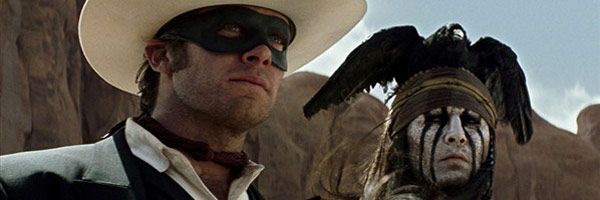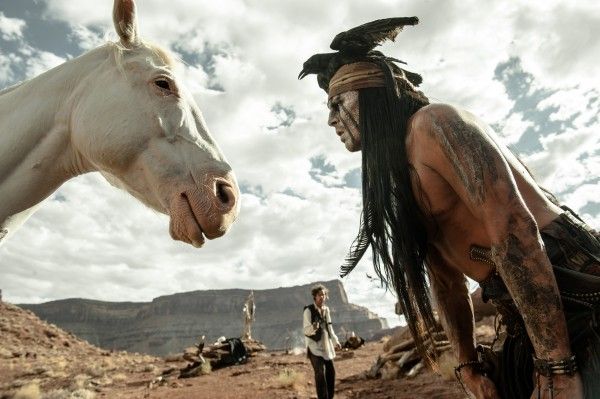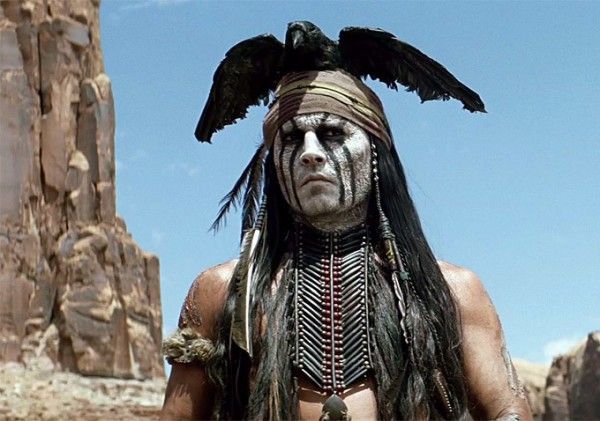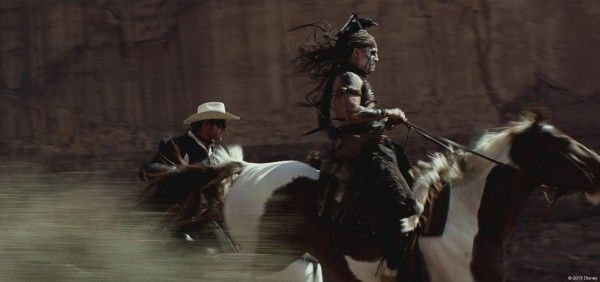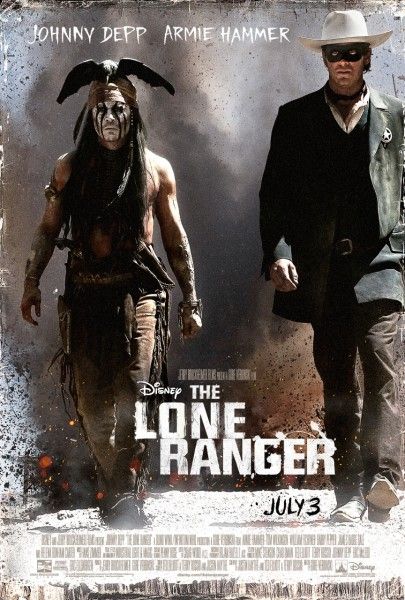I love epic westerns. The Good, the Bad and the Ugly is one of my all-time favorite films. I also adore Once Upon a Time in the West and obviously The Searchers is an undisputed classic. They're epic not only because of their length and how they take in the awe-inspiring scenery, but also in the grand motives of the characters, the sweep of their journey, and the conflict along the way. The Lone Ranger isn't epic; it's just really damn long. The flabby screenplay moves at half-speed while undeveloped characters slog through predictable motions and forced quirkiness, all of which is trapped in an erratic tone that swerves from kookiness to uncomfortably somber. Even the few redeeming aspects like Armie Hammer's endearing performance and director Gore Verbinski's skill at putting together set pieces can't stop the film from feeling like being dragged through the desert rather than a rousing ride through canyons and vistas.
Beginning with a pointless and irritating framing device, an old Tonto (Johnny Depp) tells a young boy dressed as the Lone Ranger about the real Lone Ranger, John Reid (Hammer). The nerdy Reid starts out completely unprepared for the Wild West, but begins to receive a harsh education when he encounters Tonto in the middle of the Comanche’s revenge plot against the cannibalistic Butch Cavendish (William Fichtner). Cavendish escapes, Tonto is locked up for previous crimes we never learn about, and Reid is deputized as a Ranger so he can join his "warrior" brother Dan (James Badge Dale) on the hunt for the outlaw. During their search, Dan and the rest of the posse are killed by Cavendish's gang while John is left for dead, and becomes a "spirit walker" ("one who has seen the other side"). Tonto, who inexplicably gets out of jail and conveniently shows up to where John was shot, reluctantly decides to join up with the Ranger because the white horse and "spirit animal" (the film never runs short on Native American clichés), Silver, chooses John. John puts on a mask because his enemies believe he's dead, becomes "The Lone Ranger", and joins up with Tonto to find Cavendish, who is part of a much larger scheme for no compelling reason.
If the movie had just stopped at the plot of two guys trying to find and capture a bad guy, each for their separate reasons, the film would have at least been somewhat more tolerable. But the script feels the need to cram in the obviously scheming railroad tycoon Latham Cole (Tom Wilkinson), corrupt cavalry officer Fuller (Barry Pepper), and a perfunctory love story between Dan's widow, Rebecca (Ruth Wilson) and John. For a movie obsessed with trains (they feature in film's two biggest set pieces), the movie is fittingly on rails since we know exactly where it's going on its painfully slow trip. We also constantly have to take idiotic detours such as Reid and Tonto trying to find Cavendish by stopping off at a brothel run by Red (Helena Bonham Carter), who has an ivory leg with a gun in it like a 19th century Cherry Darling.
These forced eccentricities litter the film but are never part of a definitive tone. Verbinski's previous film, Rango, which was also a western, commits to being strange, and is all the more enjoyable for how the director's creative and comic sensibilities bolster the picture. In The Lone Ranger, Verbinski seems at a loss as he tries to manage notions of injustice, nature out of balance, the demise of the Native Americans, the encroachment of modern technology, and then cramming in action scenes plus crap like Tonto constantly "feeding" the dead crow he wears on his head.
The Comanche does have a few funny moments and deadpan quips, and Depp even finds some chemistry with Hammer, but Tonto is mostly buried in a character who's as confused at the movie. Tonto plays like Jack Sparrow with all of the quirks and none of the charm. Part of what makes Tonto so off-putting is that Depp is committed to playing an outdated and offensive Native American stereotype. The film tries to balance it by showing that the other Comanche talk normally, and Tonto is simply traumatized. But it's still a white actor doing what my friend appropriately cited as a "Native American minstrel show." It's a little confusing why the film doesn't simply make Tonto a white guy who takes on what he believes is the personality of a Comanche because he feels guilt for what the white man has done. Instead, we're forced to sit through a performance that we hope will become less uncomfortable but never does. This kind of indulgence is part of what makes the movie such a chore. It seems like Depp was never told "no" to any of his ideas, and the film has to indulge the actor’s notion that audiences wouldn’t be able to get enough of his character, so we’re also forced to endure him in the useless framing device. But for all of the emphasis on Tonto, he's a static character.
It's more rewarding to see how Hammer takes on the Ranger, and even though his arc is predictable, it's still fun to watch. Hammer plays the nerd akin to Ransom Stoddard from The Man Who Shot Liberty Valance. He's the man who believes he can bring law and justice to the Old West, but learns that his beliefs are no match for the reality (a reality that, in The Lone Ranger, includes cannibalistic rabbits). It's a loose comparison—I don't recall a scene in Liberty Valance where Stoddard's head gets dragged through horseshit—but Hammer somehow manages to make the iconic character appealing. When the William Tell Overture starts playing and he rides to save the day, it feels like the Lone Ranger truly lives again. Then he rides into a complicated set piece that puts action over character, and the feeling quickly fades.
The action is still exciting, but Verbinski has found himself in a big open space with only trains to play with. The Pirates of the Caribbean movies offered the director all kinds of mythological creatures, locations, and different kinds of ships to create unique action scenes. The restrictions provided by The Lone Ranger don't inspire creativity as much as they strain Verbinski to keep the action moving even though we hardly care about anyone involved. The Lone Ranger is noble, Tonto is strange, Cavendish is evil, and Rebecca is helpless. They're figurines in a playset
Big westerns can be great, but so can tight, tense westerns that are about simple morality and justice. The Lone Ranger is a guy in a mask who, along with his sidekick Tonto, fights injustice. It’s as easy and charming as that. There's room for improvement (I like that the film tries to make Tonto the equal of the Ranger rather than a sidekick), but it's a simple premise that should never have been forced into a brainless, bloated blockbuster. Instead of cheering for an old-fashioned, white-hat-black-hat western, we wonder when the sunset is going to come along so the characters can start riding into it as quickly as possible.
Rating: D

